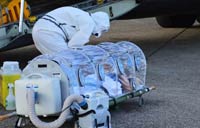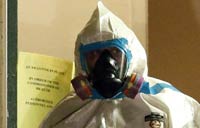US left on edge after first Ebola patient dies
Updated: 2014-10-09 15:02
(Xinhua)
|
||||||||
 |
| Sierra Leone: strike leaves Ebola dead in streets |
 |
| Ebola could reach France and UK by end-Oct |
Thomas Eric Duncan, a Liberian who flew to Texas to visit his relatives, died at 7:51 a.m. Wednesday despite having experimental treatment at Texas Health Presbyterian Hospital in Dallas, a statement from the hospital said.
Several hours later, a second person who claimed to have had contact with Duncan was hospitalized after allegedly showing signs and symptoms of Ebola.
Duncan was admitted to the hospital on Sept. 28 and has been kept in isolation then. Two days later, he tested positive for Ebola.
Before his isolation, he went to the same hospital on Sept. 25 when he already showed signs of Ebola, only to be dismissed with some antibiotics. The apparent lapse brought about criticism and doubts as to how prepared the US authorities are in dealing with the disease.
No sooner had Duncan deceased than his family asked for probe into his care.
One of his nephews called his medical treatment "unfair" in an ABC interview, suggesting that Duncan did not get the same treatment given to American citizens.
A statement from Duncan's girlfriend said she trusts "a thorough examination will take place regarding all aspects of his care."
Duncan reportedly had supportive treatment like kidney dialysis and experimental drugs at the hospital, the same treatment that five other American Ebola patients who were sent back home underwent. All five survived the deadly disease.
Duncan's condition worsened several times after he was admitted to the Dallas hospital. He had been listed in critical condition since Saturday. Although reports came Tuesday that he showed some "positive signs" and that his condition was "stable," few expected him to recover soon.
Tom Frieden, director of the US Centers for Disease Control and Prevention, told reporters that Duncan died "despite maximal interventions."
Duncan's remains will be cremated and a memorial service was held for him Wednesday evening. "The cremation process will kill any virus in the body so the remains can be returned to the family. No protective gear is needed to handle the remains after cremation," a statement from the Texas health department said.
SUSPECTED CASE
Health officials are now keeping a close eye on some 50 people who may have had contact with Duncan after he became contagious. The Ebola virus can be contracted only when someone is actively showing the symptoms.
Duncan reportedly began to show Ebola signs on Sept. 24. The disease can incubate for as long as 21 days, but mostly for eight to 10 days. The following few days, therefore, is crucial in determining whether Duncan has spread the virus to anyone else.
A sheriff's deputy who went into the apartment Duncan stayed was hospitalized Wednesday after falling ill. But authorities later said he did not have direct contact with Duncan, only with Duncan's family members who so far have not shown any suggestive symptoms of Ebola. Therefore, the deputy is unlikely to get infected with the virus.
Frieden said at a news conference later in the day that the deputy has "no definite contact and no definite symptoms" of Ebola. He remained hospitalized, however, "out of an abundance of caution."
The deputy is not among the 50 people under observation. None of them has shown any signs and symptoms for the disease, authorities said Wednesday.
BOOSTING HEALTH CHECKS
US authorities will boost Ebola health checks at five major airports to detect and track anyone who has Ebola signs or who had contact with Ebola patients in West Africa.
Passengers from Guinea, Liberia and Sierra Leone will have their temperatures taken with a non-contact thermometer and have to answer questions about their health and exposure history, the Centers for Disease Control and Prevention and the Department of Homeland Security's Customs and Border Protection said in a joint statement.
New York's JFK International Airport will begin the new screening Saturday, while international airports in Washington, New Jersy's Newark, Chicago and Atlanta will implement the new measures next week, said the statement.
By introducing enhanced entry screening at the five airports, the United States can evaluate more than 94 percent of travelers from Guinea, Liberia, and Sierra Leone, the three West African countries hardest hit by the epidemic. A White House spokesman estimated that about 150 people would be subject to these additional measures every day.
First identified in 1976, Ebola is transmitted via direct contact with bodily fluids from an infected person. It has no cures or approved vaccines so far. Early signs of the deadly disease include fever, headaches, vomiting and diarrhea. The virus has killed more than 3,400 people in West Africa since its outbreak this year.
- US Ebola patient succumbs in Texas
- Britain to deploy 750 servicemen in West Africa to tackle Ebola
- US Ebola patient dies
- 2nd UN member in Liberia tests positive for Ebola
- Spain euthanizes pet dog of Ebola-infected woman
- Another UN official in Liberia contracts Ebola
- Cameron to chair Ebola meeting as virus reaches Europe
- US to toughen Ebola screening at airports
- Xinjiang publishes anti-terror brochures
- Security pact sealed with Afghanistan
- President Xi encourages international cultural exchanges
- Premier Li: China willing to help Afghan infrastructure
- Chinese FM: China, Asia-Pacific become community of shared destiny
- Foreign minister remarks on possibility of China-Japan summit
Most Viewed
Editor's Picks

|

|

|

|

|

|
Today's Top News
VW defends safety of recalled New Sagitar
Former premier makes Hurun philanthropists list
Xinjiang publishes anti-terror brochures
SOHO endows $10m to Yale
Cook and Ma talk about partnership
Language a barrier to healthcare for Asian Americans
China businesses need innovation: VC
Security pact sealed with Afghanistan
US Weekly

|

|

















